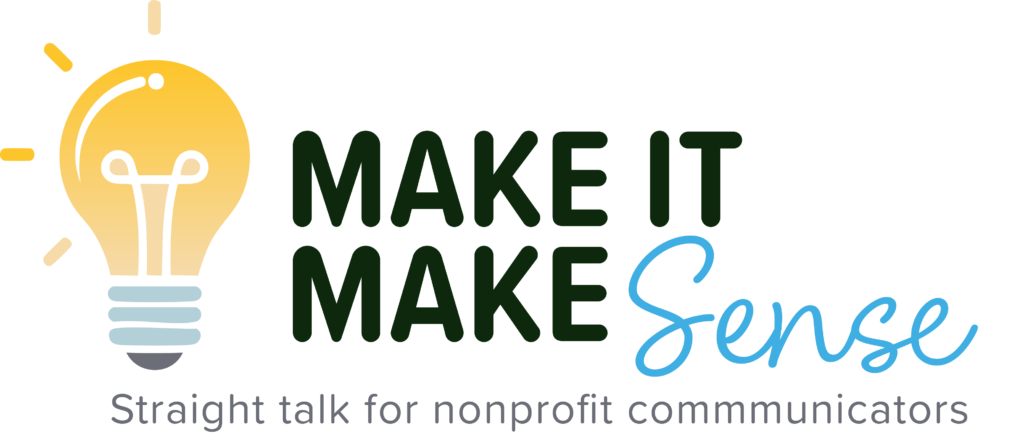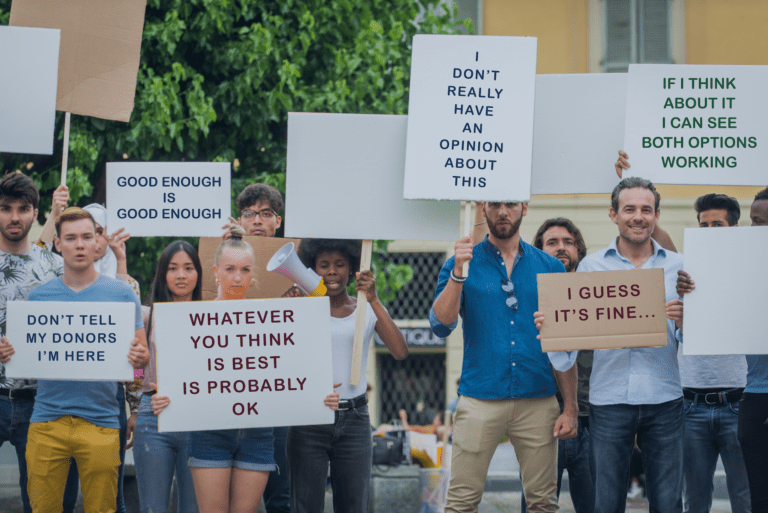Nonprofit folks love words. We craft mission statements, write heartfelt appeals, and obsess over taglines that say everything in just three emotionally loaded words. We spend hours trying to make our 2,000-word blog post accessible for our audience after someone insisted on writing the first draft at a yawnable post-grad reading level.
But for all our love of words, some of the ones we use—out of habit, good intentions, or simply because that’s how it’s always been done—are quietly sabotaging the work we’re trying to do.
Yeah, our vocabulary might be part of the problem.
We say we’re about dignity and empowerment and equity, but our language screams pity, savior complex, and stereotypes. That’s a branding problem and an ethics problem.
Damnit, it’s a decency problem.
Take a look at your nonprofit’s mission statement. Seriously, do it. Is it all flowery and kind, talking about lifting people up and being a catalyst for positive and lasting change? So why does your copy always seem to point down at the people you serve and highlight the lowest, most challenging experiences they’ve ever faced?
Now, I know that there are a lot of problematic words. We’re never going to solve for everything, and we continue to learn and be better at speaking both to and about the people we serve. This is a fairly short list, but it’s the words that are on my mind at the moment.
After you read this article, use the form below to tell me about words in your industry, why you use (or don’t use) them, and maybe I’ll make this a series.
We Are Not Defined By Our Conditions
The first thing I want to talk about is not a specific word. It’s the use of conditions to define human beings.
For example, when I was diagnosed with a form of bipolar disorder, I caught myself and others saying “I am bipolar” / “He is bipolar.” I am not bipolar. I have a condition that is known as bipolar disorder, and I work with professionals to help me manage it without sacrificing who I really am. I’m using my own example here, but it’s something that I’ve caught in others’ writing, too. Because health and mental health challenges, like food intolerances and chronic conditions, drive the decisions we make in our daily lives, we tend to associate closely with them.
This also goes for any time you’re lumping entire groups of people into the [adjective]. That’s things like the homeless or the disabled or the poor. It’s a little dehumanizing, isn’t it?
Try this instead: I have bipolar disorder, families experiencing homelessness, low-income households.
Victim / Victimize
Victim just sounds way too dramatic and disempowering. Real life doesn’t look much like an episode of SVU. When a person has experienced a trauma, they may be struggling personally with how that trauma affects their identity, but your org should look for ways to lift them up, rather than defining them by that difficult low moment. If a person chooses this term for themselves, support that choice. Some can find a certain power in it, especially if they are joining your storytelling efforts to empower others who have gone through the same experience.
Try this instead: Survivor, person experiencing [issue], or, you know, their name. 1
On the flip-side, we have victimize. Another scary, aggressive term that we use to call out people, organizations, or policies that are causing harm to our clients. Using this term does two things, in my mind. First, it positions our clients as the victims, as though they are spending their lives in the crosshairs of the offenders (this whole sentence makes me uncomfortable). Second, it creates an adversarial, almost petty name-calling dialogue with the entity you’re talking about. That doesn’t help anyone. Unless the guy on the other side of the issue is a Bond villain, they probably aren’t trying to hurt your clients. They just have different priorities. Find ways to speak to those priorities and policies and represent your clients, rather than suggesting that they’re helpless to the whims of others.
Try this instead: Subjected to, affected by (our clients were subjected to/affected by unjust policies)
At-Risk
Who isn’t at-risk these days? This is a vague, overused term that slaps a danger label on people without saying anything meaningful. I’ll write more about this in another article, but we need to do a better job of framing our stories to be people-first without being so deficit-focused. When you’re talking about your clients, use phrasing that acknowledges context.
Try this instead: underresourced communities, families experiencing hardship, students with unmet needs
Needy / Unfortunate
This isn’t a Dickens novel. And I can’t read unfortunate without hearing it in the voice of Ursula. People aren’t needy or unfortunate. These words are loaded with condescension and pity, suggesting that your clients are seeking a handout or just too unlucky to thrive.
Try this instead: socially marginalized, seeking resources, experiencing trauma
Impact
I know, this one’s everywhere. It sounds powerful, sounds huge. Hard not to love it. But impact is what asteroids do when they destroy planets. Maybe that’s why it sounds powerful and huge. It’s violent, traumatic, disruptive. Is that really what you’re going for?
Try this instead: (v.) support, strengthen, transform; (n.) reach, value, outcomes, progress, results
Target
Please don’t use language that makes it sound like your clients and community are under surveillance or attack. You target military enemies and marketing segments, not people who need your org’s services.
Try this instead: focus, engage, prioritize, center
Touch
I’ve spent much of my career working in the early childhood nonprofit sector. You wouldn’t believe how many times I’ve read we’ve touched X children. Seriously. Did that phrase make you squeamish, too? Stop using the word touch when you’re talking about people. People don’t want to be touched—they want to be helped.
Try this instead: reach, serve, work with, help
Intervene
Intervene comes last on this list because it’s the one I’m iffy about. Intervention is a commonly accepted and technical term in many human services (particularly health and crisis fields). I think about early intervention, for example, as a perfectly appropriate term for what early child care and learning professionals are doing to support children with developmental delays.
However, this word also shows up a lot when orgs are talking about their entrance into a situation. When you say things like [Organization] intervened, it can easily read as though you barged in, uninvited to fix someone or something. One solution, though more passive, could be to flip the direction of the entrance and say [Organization] was engaged to _____.
Try this instead:offer resources, work alongside, connect with services
Final Thought
Language evolves. So should we. If your org hasn’t updated its talking points since ’93, it’s probably time. Getting the language right isn’t about being perfect as much as it is about being honest. It’s about being accountable and human. Let’s stop talking about people like they’re problems to solve. Let’s talk with them, or let them do the talking for themselves through us. I’ll say it again and again, everything boils down to trust and good representation. This is one of the easiest ways to accomplish both.
- Identifying clients by name is tricky and not always OK. Given that you’re talking about very difficult moments in their lives, they often prefer to be kept anonymous, if they’re even willing to let you tell their story. There’s nothing wrong with anonymizing names (“Joe S.” for someone named Martin is just fine), as long as you have a footnote or some other marker to tell your audience that this is not the person’s real name. ↩︎




